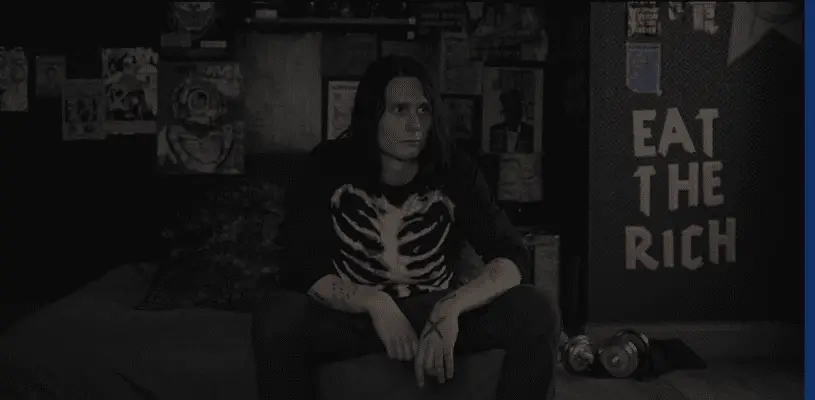I’ve written before about my love for the German sci-fi drama Dark. The third and final season dropped this past weekend, so I’m here to talk about it again. Because Dark is brilliant. Showstopping. Powerful. Masterful. It’s television at its best.
Set in the small town of Winden, Germany, Dark tells the story of a boy named Mikkel who goes missing and how the lives of four families in Winden are entangled with each other in the aftermath. Plus time travel. Lots and lots of time travel. As Sunny Moraine put it on Twitter:
Hooray it’s time for a new season of Dark, the show where everyone’s many many terrible decisions are made orders of magnitude worse by fucking around incessantly with time travel
— Sunny Moraine (dynamicsymmetry@wandering.shop) (@dynamicsymmetry) June 27, 2020
That’s pretty much it. But that’s not all there is to say, oh no! Don’t worry though, I won’t get into spoilers. This is a show you absolutely have to experience without any prior knowledge.
Everything about this final season satisfied me. It’s so lovingly and intentionally crafted: the music, the cinematography, the visual storytelling, and symbolism. There’s meaning in everything, and you can watch the show multiple times (I’ve watched S1-2 three times already) and still find something you’ve missed. It’s beautifully shot, impeccably designed, and honestly just some of the best story-crafting I’ve ever seen. Taken as a whole, Dark might be the most perfect three seasons of television I’ve ever watched.
And the casting. Oh my god, the casting. It’s perfection. Complete and absolute perfection. For a story that revolves around time travel, casting multiple actors to play the same character at different ages is essential to maintaining the suspension of disbelief. By golly, Dark does it better than anyone. It will make you wonder why Hollywood can’t do any better than CGI or old-age makeup.
Season three also found a way to build upon previous seasons without veering into the ridiculous. Sure, on paper some of the storytelling choices might make you wonder if the writers aren’t biting off more than they can chew, but trust me, they’re not.
Halfway through the season, one of my friends and I were wondering how they were going to resolve everything they’d set up in four episodes. At the same time, we were also wondering how they had packed in as much as they did in the previous four episodes, so we both knew they’d be able to pull it off. Dark is a TV series that’s only 24 episodes but when you’re done, you’ll feel like you watched twice that many episodes with four times the amount of storytelling as a normal show would need. It’s just…so dense.
S3 is also somehow even more batshit insane than the previous two seasons? And that’s saying something because I didn’t think it could get wilder after S2. Boy was I wrong.
And it all still makes sense! That’s the best part. I’m so used to time travel stories hand-waving at least half of the science and physics involved, if it bothers to address them at all. That or they lampshade the problems without dealing with them (*cough* Avengers: Endgame), which I find obnoxious. Dark not only addresses the admittedly speculative science of time travel, it does so in a way that makes complicated physics seem approachable, nay, reasonable.
Pretty much all of my questions from the previous two seasons were resolved. I honestly can’t think of a single significant element that they didn’t address, or even an insignificant one. They thought of everything. Not only that, but they also resolved the storyline in a unique and unexpected way. It takes a lot to surprise me with storytelling, but I was screaming with sheer delight when I got to the season finale and the whole beautiful, time-twisted rose bloomed before me.
I haven’t been more satisfied by a television show. Ever.

One of the things I love most is how the show finds a way to make certain characters sympathetic as the story unfolds. Just as S2 found a way to make Ulrich and Noah—two characters I despised after S1—sympathetic, S3 finds a way to make other characters sympathetic that I wouldn’t have expected, like Hannah. Other characters like Marta and Elizabeth get more nuanced in interesting, and painful (of course), ways that I can’t tell you because spoilers.
More than anything, what brings me back to Dark is how a show about time travel is also simultaneously about mental health, intergenerational trauma, and how we as human beings cope with grief and loss. How we hurt others and ourselves and our children believing we’re doing the right thing and trying to make things better. How we coat our coping mechanisms with religious language to justify our actions but deep down, all religion is about how we deal with pain and suffering. How characters relate to time isn’t just a cool plot device, it’s a fundamental aspect to the story they’re trying to tell on a thematic and emotional level.
Every time I watch through Dark I find another layer of meaning that resonates with my life and experiences. Season 3 both expanded on and enriched these layers for me. It’s brilliantly told and deeply poignant.
Believe me when I tell you that I’m going to be watching this over and over and over again. I’m already planning on rewatching the first two seasons (for the fourth time) and then rewatching S3 because I know there are things I’ve missed.
We’ve got plenty of time on our hands (heh heh) with the quarantine, so go ahead, indulge in some time travel f*ckery and complicated family dynamics. You deserve it, as a treat.

